Consequences of Vatican II
 |
 |
 |
 |
 |
 |
 |
Amazonia Synod – Part II
An Atomic Bomb inside the Church
In the 1970s, Prof. Plinio Corrêa de Oliveira published a work denouncing the missionaries who opposed the catechization and civilization of the Indians. The book,
Indigenous Tribalism, Communist Missionary Ideal for the 21st
Century, was a prophetic warning that, in summary, affirmed:
“Brazilians must oppose the new progressivist missionary work that aims to change the doctrine of the Holy Catholic Church. Brazilians of Faith, stand up!”
That book was not written just for that time; it applies perfectly to our chaotic and agitated 21st century. It applies above all to the coming Amazon Synod that should profoundly affect the future of the Church and temporal society. This meeting, as noted before, plans to change the customs of the Church and the very concept of civilization not only in the Amazonia, but all over the world.
Catholics need to pay attention to this “new way” that meshes an integral ecology with the indigenous tribes in order to model a new Church with an Amazonian face.
Traditional concept of Catholic mission
According to the traditional conception of the Catholic mission, the missionary represents Jesus Christ to the primitive peoples and strives to convert them to the True Faith. The Church teaches that the normal way for men to be saved is to be baptized, believe and profess the doctrine and the law of Jesus Christ. To bring men to the Church is, then, to open the doors of Heaven for them.
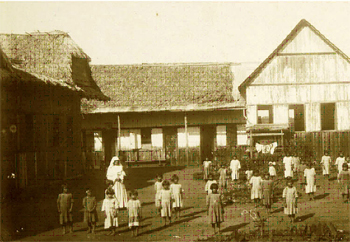
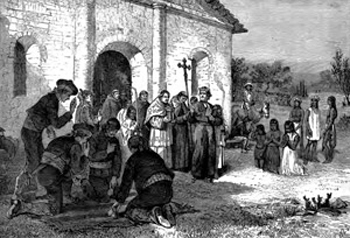 From the apostolic times to Vatican II, the missionary had the duty to teach the gentiles the doctrine of Christ based on the mandate: “Go, and teach all the nations… teaching them to observe all things whatsoever I have commanded you.” (Mt 28: 18-29)
From the apostolic times to Vatican II, the missionary had the duty to teach the gentiles the doctrine of Christ based on the mandate: “Go, and teach all the nations… teaching them to observe all things whatsoever I have commanded you.” (Mt 28: 18-29)
The glory of God and the eternal salvation of men are the transcendent final ends of the missions. This does not prevent the mission from harvesting other earthly fruits that make up part of civilizing the peoples.
To civilize and to Christianize are, then, correlated terms. It is impossible to seriously Christianize without civilizing and vice-versa.
To be a missionary in Brazil is principally to convey the Gospel to the Indians. It is to persuade them to free themselves from their superstitions and barbarian customs that have enslaved them, and to bring them to the practice of the Ten Commandments of God’s Law. It is to civilize them so that they may reach their celestial end. The traditional missionary could say: “You shall know the truth and the truth shall make you free.” (Jn 8:32)
A tribalist Synod
In his speech at Puerto Maldonado (January 19, 2018) Pope Francis explained that the diverse spiritualties and beliefs of the indigenous peoples of the Amazonia motivate them to live in communion with the land, water, trees, animals, day and night. The pajes (shamans or witch doctors) would supposedly promote harmony among the peoples and with the cosmos. All are “a living memory of the mission that God entrusted to us all: the protection of our Common Home.”
In other words, the Pope tried to justify the pantheistic hues underlying the indigenous beliefs and give them a social connotation: to care for the forests, “our common home.”
However, Catholic Faith has nothing in common with those fetish beliefs. The Church has always condemned them as pagan and idolatrous.
In parallel, the social-political ideal that seems to be behind this new ecological missiology is not so much the protection of the indigenous peoples as to declare the Amazonia an independent territory, untied from the countries to which it belongs today. It should become a “indigenous patrimony.” This means that the leaders of Liberation Theology, who actually dictate what the Indians should think, would have an enormous territory at their disposal to construct their communist and theocratic utopias.
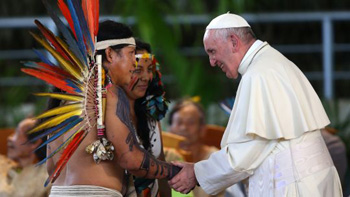 It is not difficult to see that the Amazonia Synod will play a crucial role in this maneuver.
It is not difficult to see that the Amazonia Synod will play a crucial role in this maneuver.
Against this tendency of giving autonomy to Indians, Prof. Plinio Corrêa de Oliveira had already warned Brazilians in another of his works:
“If the proposed Constitution adopts such an hypertrophied conception of the rights of the Indians, this will open the way to recognizing a type of diminutae rationis [partial] sovereignty of the various indigenous groups. A self-determination, according to the consecrated expression (The Proposed Constitution: Anguish for the Nation – Projeto de Constituição angustia o País, São Paulo: Ed. Vera Cruz, 1987, pp. 182, 119).
These words were praised by Justice Marco Aurélio de Mello of the Brazilian Supreme Court of Law, who affirmed: “These were prophetic words, considering the fact that in September 2007 Brazil concurred in the U.N. General Assembly to approve the Universal Declaration on the Rights of the Indigenous Peoples” (cf. Catolicismo, n. 700, April 2009).
Updated missionary voices
The “prophetic” and communist character of the progressivist ideals appears in various documents issued by Brazilian institutions, personages and missionary organs. Some texts follow:
Evangelization & civilization
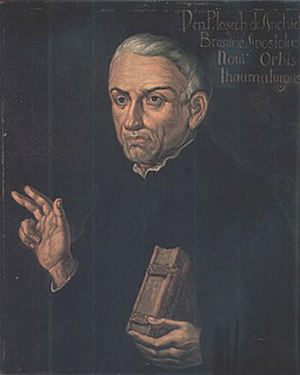 Even Card. Gerhard Müller, ex-prefect of the Congregation for the Doctrine of the Faith, had words of critique for the coming Synod:
Even Card. Gerhard Müller, ex-prefect of the Congregation for the Doctrine of the Faith, had words of critique for the coming Synod:
“The Amazonia Synod is a pretext to change the Church, and the fact that it will take place in Rome is to emphasize the beginning of a new Church.”
The substance of Catholic teaching is immutable. It was given to us by Christ, preserved and maintained by the Church, and no one can alter it until the end of time. The substance of the teaching cannot be altered, an alteration understood not only as the introduction of strange elements, but also any omission of its essential parts.
The catechetical methods of Fr. José de Anchieta and Fr. Luís de Grã translate these principles to practical action. When those missionaries saw the abominations and aberrations of the unfortunate aborigines, they did not fear to show how strongly Catholic Morals opposed them. They asked the Indians to abandon those vices and idolatries.
Let us pray to Our Lady Aparecida, Queen and Patroness of Brazil, to intercede with her Divine Son for the true Church of Christ in Brazil and in the world, that He not allow the progressivists to destroy her from the top down. It only remains for us to confide in the promises of Our Lord: “The gates of Hell shall not prevail” (Mat 16:18) and Our Lady in Fátima: “In the end, my Immaculate Heart will triumph.”
Continued

“Brazilians must oppose the new progressivist missionary work that aims to change the doctrine of the Holy Catholic Church. Brazilians of Faith, stand up!”
That book was not written just for that time; it applies perfectly to our chaotic and agitated 21st century. It applies above all to the coming Amazon Synod that should profoundly affect the future of the Church and temporal society. This meeting, as noted before, plans to change the customs of the Church and the very concept of civilization not only in the Amazonia, but all over the world.
Catholics need to pay attention to this “new way” that meshes an integral ecology with the indigenous tribes in order to model a new Church with an Amazonian face.
Traditional concept of Catholic mission
According to the traditional conception of the Catholic mission, the missionary represents Jesus Christ to the primitive peoples and strives to convert them to the True Faith. The Church teaches that the normal way for men to be saved is to be baptized, believe and profess the doctrine and the law of Jesus Christ. To bring men to the Church is, then, to open the doors of Heaven for them.

Indians at recreation in a Salesian mission in the Amazon; below, mission prayer before the work day

The glory of God and the eternal salvation of men are the transcendent final ends of the missions. This does not prevent the mission from harvesting other earthly fruits that make up part of civilizing the peoples.
To civilize and to Christianize are, then, correlated terms. It is impossible to seriously Christianize without civilizing and vice-versa.
To be a missionary in Brazil is principally to convey the Gospel to the Indians. It is to persuade them to free themselves from their superstitions and barbarian customs that have enslaved them, and to bring them to the practice of the Ten Commandments of God’s Law. It is to civilize them so that they may reach their celestial end. The traditional missionary could say: “You shall know the truth and the truth shall make you free.” (Jn 8:32)
A tribalist Synod
In his speech at Puerto Maldonado (January 19, 2018) Pope Francis explained that the diverse spiritualties and beliefs of the indigenous peoples of the Amazonia motivate them to live in communion with the land, water, trees, animals, day and night. The pajes (shamans or witch doctors) would supposedly promote harmony among the peoples and with the cosmos. All are “a living memory of the mission that God entrusted to us all: the protection of our Common Home.”
In other words, the Pope tried to justify the pantheistic hues underlying the indigenous beliefs and give them a social connotation: to care for the forests, “our common home.”
However, Catholic Faith has nothing in common with those fetish beliefs. The Church has always condemned them as pagan and idolatrous.
In parallel, the social-political ideal that seems to be behind this new ecological missiology is not so much the protection of the indigenous peoples as to declare the Amazonia an independent territory, untied from the countries to which it belongs today. It should become a “indigenous patrimony.” This means that the leaders of Liberation Theology, who actually dictate what the Indians should think, would have an enormous territory at their disposal to construct their communist and theocratic utopias.

Francis at Puerto Maldonado greets natives and calls the Amazon forest the 'heart of the Church'
Against this tendency of giving autonomy to Indians, Prof. Plinio Corrêa de Oliveira had already warned Brazilians in another of his works:
“If the proposed Constitution adopts such an hypertrophied conception of the rights of the Indians, this will open the way to recognizing a type of diminutae rationis [partial] sovereignty of the various indigenous groups. A self-determination, according to the consecrated expression (The Proposed Constitution: Anguish for the Nation – Projeto de Constituição angustia o País, São Paulo: Ed. Vera Cruz, 1987, pp. 182, 119).
These words were praised by Justice Marco Aurélio de Mello of the Brazilian Supreme Court of Law, who affirmed: “These were prophetic words, considering the fact that in September 2007 Brazil concurred in the U.N. General Assembly to approve the Universal Declaration on the Rights of the Indigenous Peoples” (cf. Catolicismo, n. 700, April 2009).
Updated missionary voices
The “prophetic” and communist character of the progressivist ideals appears in various documents issued by Brazilian institutions, personages and missionary organs. Some texts follow:
- “The Indians are still not corrupted by the system in which we live. The Church needs to bring real hope to the oppressed. ‘They were brothers and had everything in common.’ This responds to the demands of the poor. … The indigenous communities are a prophetic future of this new way of living, where what is most important is man” (Conclusions of the 1st Assembly of the National Indigenous Missionary Council, doc. 1, p.7, section 1, n.1)
- “The indigenous communities must be accepted as evangelizers, so that they become the model for our society, which has much to learn from them” (Archbishop Fernando Gomes of Goiania, section 4, n.14).
- “Today's missionary action discovers evangelical values in the indigenous culture, so that the Indian is not only evangelized, but he is also able to evangelize us through the fraternal relationship they have among themselves” (Bishop Tomás Balduino of Goias, President of the Indigenous Mission Council, CIMI, doc. 14, section 5, n. 17).
- “The profound conviction of missionaries aligned to the Church is that these indigenous peoples are the true evangelizers of the world. We, the missionaries, do not go to them as ones who convey a doctrine and evangelization that Christ brought and entrusted to us, which we wrapped in civilized rites and cults. Rather, we go to them knowing that Christ has already preceded us in their midst and that the ‘seeds of the Word’ are already there.” (Ibid., doc. 18, section 5, n. 21)
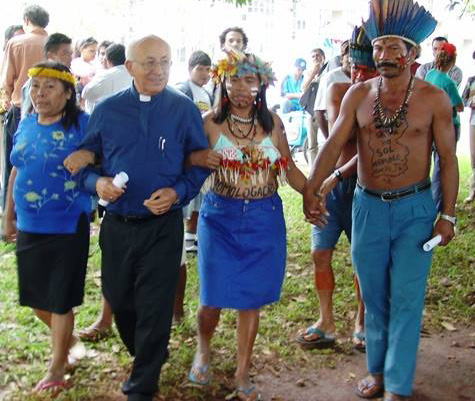
Bishop Balduino, arm in arm with the Indians he says should evangelize Catholics...
Evangelization & civilization

Fr. José de Anchieta, a missionary miracle worker who made no concession to the errors of the Indians
“The Amazonia Synod is a pretext to change the Church, and the fact that it will take place in Rome is to emphasize the beginning of a new Church.”
The substance of Catholic teaching is immutable. It was given to us by Christ, preserved and maintained by the Church, and no one can alter it until the end of time. The substance of the teaching cannot be altered, an alteration understood not only as the introduction of strange elements, but also any omission of its essential parts.
The catechetical methods of Fr. José de Anchieta and Fr. Luís de Grã translate these principles to practical action. When those missionaries saw the abominations and aberrations of the unfortunate aborigines, they did not fear to show how strongly Catholic Morals opposed them. They asked the Indians to abandon those vices and idolatries.
Let us pray to Our Lady Aparecida, Queen and Patroness of Brazil, to intercede with her Divine Son for the true Church of Christ in Brazil and in the world, that He not allow the progressivists to destroy her from the top down. It only remains for us to confide in the promises of Our Lord: “The gates of Hell shall not prevail” (Mat 16:18) and Our Lady in Fátima: “In the end, my Immaculate Heart will triumph.”
Continued

Posted July 24, 2019
______________________
______________________
 Volume I |
 Volume II |
 Volume III |
 Volume IV |
 Volume V |
 Volume VI |
 Volume VII |
 Volume VIII |
 Volume IX |
 Volume X |
 Volume XI |
 Special Edition |


